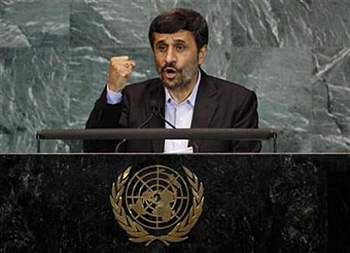
|  |  |  Americas & Beyond Americas & Beyond  
Ahmadinejad Tells U.N. Most Blame U.S. Government for 9/11
 Louis Charbonneau - Reuters Louis Charbonneau - Reuters
go to original
September 24, 2010


| | Iran's President Mahmoud Ahmadinejad addresses the 65th United Nations General Assembly at U.N. headquarters in New York, September 23, 2010. (Reuters/Mike Segar) |  |
United Nations - Iranian President Mahmoud Ahmadinejad told the United Nations Thursday most people believe the U.S. government was behind the attacks of September 11, 2001, prompting the U.S. delegation to leave the hall in protest.

Addressing the General Assembly, he said it was mostly U.S. government officials and statesmen who believed al Qaeda Islamist militants carried out the suicide hijacking attacks that brought down New York's World Trade Center and hit the Pentagon.

Another theory, he said, was "that some segments within the U.S. government orchestrated the attack to reverse the declining American economy, and its grips on the Middle East, in order to save the Zionist regime." Ahmadinejad usually refers to Israel as the "Zionist regime."

"The majority of the American people as well as most nations and politicians around the world agree with this view," Ahmadinejad told the 192-nation assembly, calling on the United Nations to establish "an independent fact-finding group" to look into the events of September 11.

As in past years, the U.S. delegation walked out during Ahmadinejad's speech. It was joined by all 27 European Union delegations and several others, one Western diplomat said.

Mark Kornblau, spokesman for the U.S. mission to the United Nations, reacted before Ahmadinejad finished speaking.

"Rather than representing the aspirations and goodwill of the Iranian people, Mr. Ahmadinejad has yet again chosen to spout vile conspiracy theories and anti-Semitic slurs that are as abhorrent and delusional as they are predictable," he said.

"COVERED UP"

Ahmadinejad raised a third theory about the attacks, saying: "It was carried out by a terrorist group, but that the American government supported and took advantage of the situation. Apparently this viewpoint has fewer proponents."

He said the main evidence for that theory was "a few passports found in the huge volume of rubble and a video of an individual whose place of domicile was unknown but it was announced that he had been involved in oil deals with some American officials."

"It was also covered up and said that due to the explosion and fire no trace of suicide attackers was found," he added.

Similar to past years, the Iranian president used the General Assembly podium to attack Iran's other arch foe, Israel, and to defend the right of his country to a nuclear program that Western powers fear is aimed at developing arms.

"This regime (Israel), which enjoys the absolute support of some western countries, regularly threatens the countries in the region and continues publicly announced assassination of Palestinian figures and others, while Palestinian defenders ... are labeled as terrorists and anti-Semites," he said.

"All values, even the freedom of expression, in Europe and the United States are being sacrificed at the altar of Zionism," Ahmadinejad said.

The Iranian president has previously raised doubts about the Holocaust of the Jews in World War Two and said Israel had no right to exist.

Tehran has been hit with four rounds of U.N. sanctions for refusing to halt its nuclear enrichment program. U.S. President Barack Obama earlier told the assembly that the door to diplomacy was still open for Iran, but it needed to prove its atomic program is peaceful, as it says it is.

Wednesday, foreign ministers from the five permanent U.N. Security Council members and Germany said they hoped for a negotiated solution to the standoff with Tehran.

Ahmadinejad criticized the Security Council for imposing sanctions on his country, saying the penalties were "destroying the remaining credibility" of the 15-nation body.

(Editing by Eric Walsh)
|

 |
|  |



